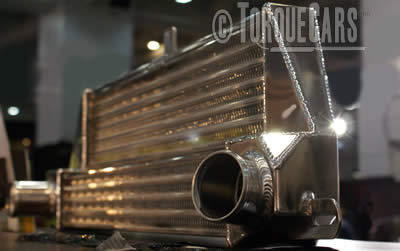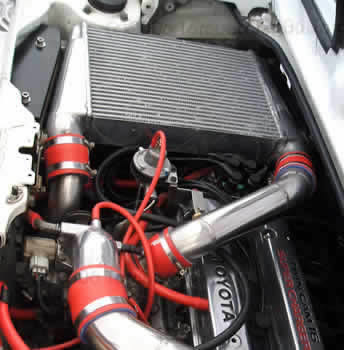The advantages of adding aftermarket intercoolers.
"Keeping your cool"
If you don't have a turbocharger or supercharger you don't need an intercooler.
The intake air temps on a NA (naturally aspirated) engine are as low as they can realistically get so you'd just be adding drag to the airflow.
One problem with a Turbo is the close proximity of the cold intake charge with the hot exhaust temperatures within the turbo.
Don't forget that a big air intake heat rise comes from the actual compression of air so even supercharged engine will benefit from an intercooler.
If you have ever felt the nozzle on a tyre pump you will realise that when air is compressed it gains heat.
We know from our chemistry and physics lessons that the colder air is the more oxygen it carries.
Why is this important? To burn fuel you need oxygen and, the more oxygen you have, the more fuel you can burn, which increases the power output of the car. See the article on air intakes for more information.
What is an intercooler and what does it do?
An intercooler is effectively a radiator which allows the intake air charge to be cooled before it gets into the engine.
You would ideally mount an intercooler in front of the radiator so that it benefits from all that nice cold air hitting it.

It would be plumbed in after the air intake filter and after the turbo or supercharger where most of the heat is added.
Most cars have front mounted intercoolers which sit in front of the radiator and as a result they tend to offer superior air cooling over top mounted intercoolers.
You need to take into account the fact that the air reaching the radiator is reduced so you may in extreme cases need to uprate your cars radiator to maintain low on track temperatures.
Power benefits from an intercooler
An intercooler will not add power it is one of those mods that frees up power, so it removes a restriction. It will address the engines ability to pull air in as efficiently as possible and provide as much cooling for as long as possible.
An efficient intercooler design can give the benefit of 5% to 10% more power and resist heat soak for longer!
Please watch our video which covers the benefits of adding an intercooler to your car. Be sure to keep up with our latest YouTube content and subscribe.
Front mounted or top mounted?
Top mounted intercoolers
- Pros - shorter path from the compressor to the engine so better air flow and lighter
- Cons - less cooling as air will need be forced down and hot air rises from the engine bay so will be more prone to get warm quicklly
Front mounted intercoolers
- Pros - Provides the best cooling as it's facing the air coming into the engine, you generally have more space for a FMIC and they are easier to fit as most OEM intercoolers are at the front or side of the engine bay.
- Cons - Longer intake path from the compressor to the engine, adds weight to the car
Some cars have from the factory a top mounted intercoolers which suck air in through the bonnet, this may mean that when the car is stationary it is actually being hit by warm air coming from the engine bay.
This can actually improve economy as you are able to burn less fuel because the air is warmer and you certainly don't want to be pulling big power figures whilst ticking over in traffic.
The Subaru Impreza springs to mind as a car with a top mounted intercooler. A top mounted intercooler offers a substantially shorter air flow route into the engine but will need an air scoop on the top to channel air through it potentially causing drag.
All turbo cars will benefit from an intercooler and improvements can be made on the standard factory fit intercoolers. You need to remember that you want to suck as much air into the engine as possible, so if the intercooler internal core hinders airflow you will actually lose some power.
Designing an intercooler
The 2 factors which make an intercooler work are the internal flow characteristics and the cooling fins.
Ideally, the fins will have the largest surface area and the internal core will benefit from a low number of tapered bends and no internal welds to cause turbulence.

Some argue that all intercoolers restrict the airflow, but considering the benefits gained by having a good quality one fitted and the minimal loss of airflow inherent in a well designed intercooler the argument does not stack up.
As a rule of thumb you would typically use 3 liters of intercooler capacity for each 100bhp. This is clunky but it seems to work well for most cars between 150 and 400bhp!
In reality using an intercooler which is too large can hinder airflow so there is an important case of getting the correct size for the application (this is something which can be discussed in more detail in our forum.) Bigger is not always better!
For a boost level of 15PSi, we at TorqueCars would expect a pressure drop of .5 to .9 psi with some applications losing 1.3psi in the worst case scenario. (Just as increasing pressure increases temperature so decreasing pressure is the result from lowering the air temperature so don't blame the intercooler design for the entire loss of pressure.
Weight is always an issue in performance cars and many after market intercoolers are both lighter than their factory equivalents and offer substantially better performance gains.
As a general rule of thumb a slightly bigger intercooler will have better cooling properties although it usually creates more drag.
This extra drag needs be carefully weighed up against the cooling offered. The longer the air is inside the intercooler the better the cooling effect will be.
Some cars have a spray nozzle to spray the intercooler with water or nitrous, therefore reducing the intake temperature further as the liquid evaporates using heat from the air flowing through the intercooler.
The actual power gain from an efficient intercooler design over OEM is typically between 5% and 10% with a temperature drop of 35C-40C and this will obviously depend on the ambient temperature - the bigger the difference between intake temp and ambient temp the better the cooling effect.
Eventually even large efficient intercoolers will suffer from heat soak. This is where the intercooler itself starts to warm up typically after longer periods of high boost driving.
Generally speaking the larger the intercooler the longer it resists heat soak for. So if you are looking for the maximum benefits from an intercooler you need to obtain the optimum size.
Please join us in our friendly forum to catch up with the latest trends in tuning and car modification for your car.
Please Check out my YouTube channel, we're regularly adding new content...
PLEASE HELP: I NEED YOUR DONATIONS TO COVER THE COSTS OF RUNNING THIS SITE AND KEEP IT RUNNING. I do not charge you to access this website and it saves most TorqueCars readers $100's each year - but we are NON PROFIT and not even covering our costs. To keep us running PLEASE Donate here
If you liked this page please share it with your friends, drop a link to it in your favourite forum or use the bookmarking options to save it to your social media profile.
Feedback - What do You Think?
Please use our forums if you wish to ask a tuning question, and please note we do not sell parts or services, we are just an online magazine.
Help us improve, leave a suggestion or tip
Please watch this video and subscribe to my YouTube channel.
3 Responses to “Benefits of an intercooler”

 Click to accept YouTube Cookies & Play.
Click to accept YouTube Cookies & Play.
Compressed air becomes cooler, but you wrote it gains heat.. I don’t understand.. please help.
Compressing air gains heat (as stated).
Pressure is proportional to Temperature > Increasing Pressure implies increasing Temperature
Compressing air makes it hotter, but colder air is more dense to begin with.